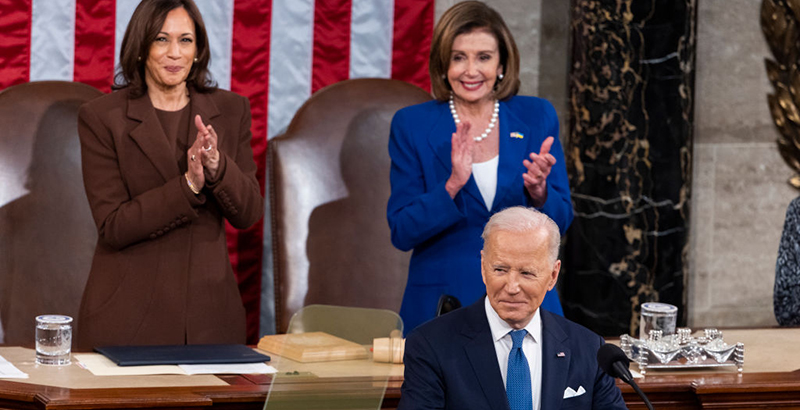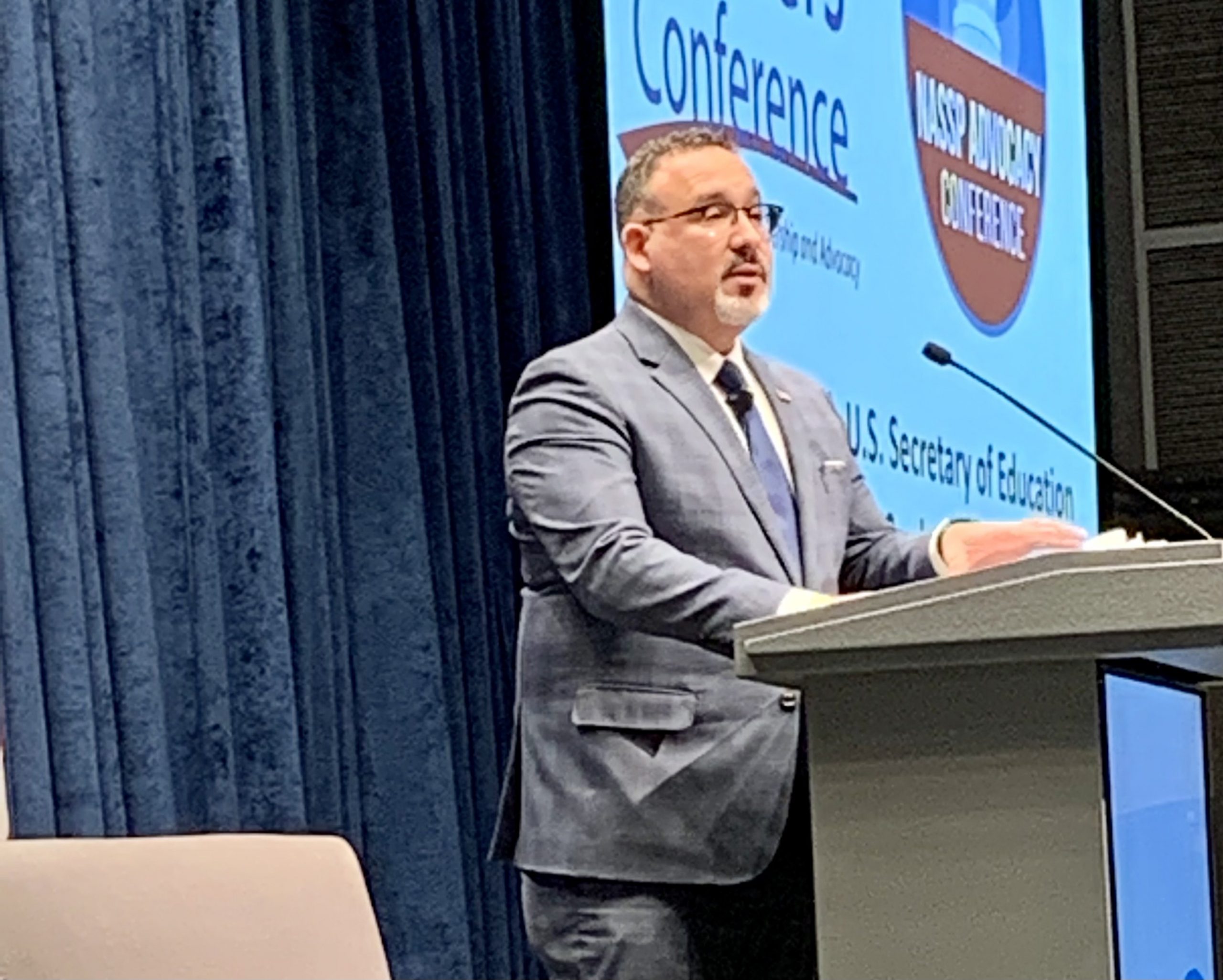State of the Union: Biden Addresses Student Mental Health, Saying Their ‘Lives and Education Have Been Turned Upside-Down’

Get stories like this delivered straight to your inbox. Sign up for The 74 Newsletter
Updated
Declaring that children’s “lives and education have been turned upside-down,” President Joe Biden used his first State of the Union address Tuesday night to highlight the pandemic’s blow to student mental health and fixed some of the blame on social media.
Earlier in the day, the White House released highlights of Biden’s plan to use federal relief funds to double the ranks of school social workers and counselors. The administration also said the president will propose $70 million in early-childhood mental health funding as part of his 2023 fiscal year budget and has already included $1 billion in his 2022 budget request for school-based mental health services.
The White House linked students’ social and emotional struggles to academic outcomes, pointing to early data revealing that students were four to five months behind in math and reading.
Hinting at COVID’s lingering effects, Biden urged Congress to “take on mental health, especially among our children.”
While his address largely focused on the war in Ukraine and the lagging American economy, Biden also signaled a major shift in the pandemic’s disruption to education.
“Our schools are open,” he said. “Let’s keep it that way. Our kids need to be in school.”
He highlighted federal relief funds designed to help students make up for lost learning, urging “every parent to make sure your school does just that. And we can all play a part — sign up to be a tutor or a mentor.”
The attention to mental health comes amid mounting evidence of the pandemic’s negative impact on student well-being. The Centers for Disease Control and Prevention released data last week showing increases in emergency room visits among teen girls have increased since 2020 for behaviors ranging from eating disorders to anxiety.
In December, Walter Gilliam, a professor of child psychiatry and psychology at Yale School of Medicine, briefed the administration on preliminary data showing that at least half of early educators report some children are acting out more and showing symptoms of depression and anxiety.
While states have previously used federal child care funds for early-childhood mental health, he said he’s never seen anything “of this size and nature.”
“It’s certainly the right time for it,” he said. “To have money that is carved out very specifically for early-childhood mental health is completely new.”
During the state-of-the-union, Biden also pointed to the ill effects of “addictive” social media and called for tighter restrictions.
‘We must hold social media platforms accountable for the national experiment they’re conducting on our children for profit,” he said. “It’s time to strengthen privacy protections, ban targeted advertising to children, demand tech companies stop collecting personal data on our children.”
A report from U.S. Surgeon General Vivek Murthy issued last year argued that some platforms were pitting students against each other, contributing to cyberbullying and undermining school safety.
The president also referenced state-level legislation targeting transgender students. He called on Congress to pass the Equality Act, intended to eliminate LQBTQ discrimination.
“I will always have your back as your president, so you can be yourself and reach your God-given potential,” he said.
In the Republican response, Iowa Gov. Kim Reynolds said Biden has taken the country’s economy backward and called students’ experiences over the past two years “unconscionable.”
“Our kids have been left behind and so many will never catch up. That’s why Iowa was the first state in the nation to require that schools open their doors,” she said, adding that Americans are “tired of politicians who tell parents they should sit down, be silent and let government control their kids’ education.”
Her remarks on parental empowerment and government overreach in schools echoed themes many Republicans hope will lead them to victory in upcoming midterm elections.
Last year, Reynolds was among the first governors to sign legislation restricting discussions of race in the classroom, and fought mask mandates in the courts. She cited the U.S. Department of Justice’s inquiry into parents protesting at school board meetings.
“The Department of Justice treats parents like domestic terrorists, but looters and shoplifters roam free,” she said.

Prior to the president’s address, Education Secretary Miguel Cardona, a former elementary school principal in Meriden, Connecticut, addressed student mental health in a talk with school leaders gathered in Washington to advocate for increased federal funding.
“You spend the majority of your day addressing symptoms of unmet needs in students,” Cardona told members of the National Association of Elementary School Principals. “You can probably count on one hand the number of professionals in your building who are trained and educated.to serve the needs of those students. A principal becomes a manager of a crisis.”
Jacqueline Shirey, at-risk coordinator for the Beaumont Independent School District in Texas, east of Houston, told The 74 that even “seasoned” educators are feeling overwhelmed by students’ behavior. Schools are seeing spikes in disputes and students skipping class, as well as vaping and drug use.
“It’s unlike anything we’ve ever seen,” she said. “Students’ needs are so elaborate. They’re very hard to reach right now.”
Parents and grandparents are also having a hard time reaching children. “Children are being defiant. Children are indulging in things that they normally have not been. Some are suffering from depression,” said Mamie Cosey, a great grandmother in East Saint Louis, Illinois. She’s raising her granddaughter’s three teenagers, including a ninth grader suspended last fall for a drug infraction.
‘A watershed moment’
Josh Golin, the executive director of Fairplay, a nonprofit focusing on the impact of commercialism on children, called the president’s remarks on social media “a watershed moment for families, children, and all those working to create a healthier media environment for young people.”
Katherine Solis, a ninth grade English language arts teacher at Sahuarita High School near Tucson, Arizona, has seen the problems first-hand. She allows students to use phones in her classroom for schoolwork, but too often those activities are interrupted by messages or TikTok and Snapchat notifications that negatively affect their moods, she said.
“The social media is insane,” she said. “They can be engaged with a vocabulary lesson, but I can’t stop the social media presence that comes into my room.”
Nicole Moore, principal of Indian Mills School in Shamong, New Jersey, hopes the administration also focuses on staff well-being, adding that she’s seen “Zoom in a room” — providing live instruction to students remotely while still teaching students in the classroom — bring one of her strongest teachers to tears.
“The adults are the forgotten group,” said Moore, who was among the 180 elementary principals gathered in Washington this week.
Jill Bohnenkamp, who leads the Center for School Mental Health at the University of Maryland, told the attendees at the NAESP leadership conference there are also free staff training programs and tools educators can use to build “mental health literacy.” She said even creating a “shout-out wall” with positive messages for students and staff members can help “re-energize” a school.
“If we’re thinking about … low cost, high-impact strategies, this is where it’s at,” she said. Following her presentation, she said the issue crosses party lines and that data shows a connection between school-based mental health efforts and better academic outcomes. She called the president’s attention to the issue “an investment in our next generation.”
Get stories like these delivered straight to your inbox. Sign up for The 74 Newsletter

;)
